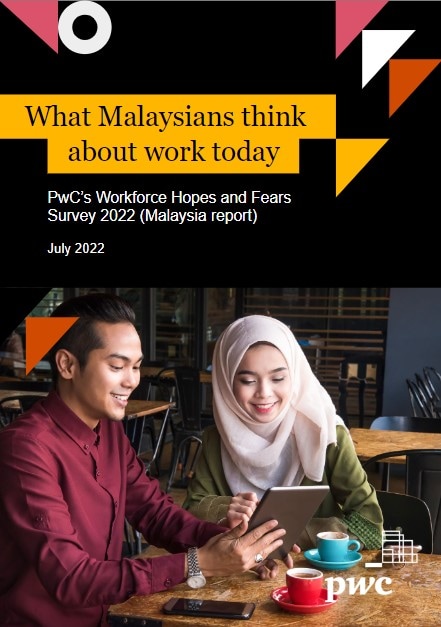
Behind every successful organisation is an engaged and motivated workforce. That’s a fact. But amid economic uncertainty and the rippling effects of COVID-19 that have resulted in the Great Resignation, there can be no doubt that employee sentiments are changing along with their priorities. And that impacts engagement and morale.
Our ‘Workforce Hopes and Fears Survey 2022 (Malaysia report)’ investigates what Malaysians think about work today, exploring areas like job satisfaction, their views on skills and training, the factors that influence their decision to switch employers, work arrangement preferences, and more. Drawing upon the 2,086 local responses received, we provide insights aimed at helping you improve the skills, drive, and productivity of your workforce, the core of which is so you ultimately strengthen employee trust. We hope our findings will serve as a springboard for important conversations around the necessary action organisations must take now in order to attract and retain top talent.
Explore the key findings
Amid the skills shortage, Malaysian respondents recognise the worth of their talent
There’s been no lack of discussion on the skills shortage, and it appears Malaysian respondents believe the scarcity of skills is a problem we’re facing here, with 32% saying the country lacks people with the skills to do their kind of work. Against this backdrop, Malaysian respondents are recognising the value of their talent, as nearly half of our local respondents (48%) strongly or moderately agree that their job requires specialist training.
With this confidence in their abilities, it’s not surprising that in the next 12 months, 32% of Malaysian respondents are extremely or very likely to ask their employers for a raise, while 28% are extremely or very likely to ask for a promotion.
Conversations around pay and progression can be delicate, but employers need to be prepared to have them, especially now, given employees are feeling empowered to broach the subject. Clarity on an organisation’s performance management framework would help facilitate these discussions, as employees deserve to have a clear understanding of how their work is linked to remuneration and advancement opportunities
32%
say the country lacks people with the skills to do their kind of work.
32%
will likely ask for a raise in the next 12 months.
48%
say their job requires specialist training.
28%
will likely ask for a promotion in the next 12 months.

Financial reward and personal fulfillment have the biggest influence on the Great Resignation
Overall, Malaysian respondents (59%) are satisfied with their job. While the job satisfaction finding is certainly encouraging, we can’t ignore the fact that among our pool of respondents, 17% are extremely or very likely to switch to a new employer in the next 12 months.
So what are employees looking for in a workplace? What are the considerations they take into account when deciding whether to stay or leave?
It comes as no surprise that pay is the top factor, what with rising inflation and the economic uncertainty brought about by the pandemic. But while pay definitely matters, it isn’t the only factor that will push employees to explore greener pastures. Job fulfillment matters too.

59%
are satisfied with their job.
17%
are extremely or very likely to switch to a new employer in the next 12 months.
69%
say pay is extremely or very important when they consider making a change in their work environment.
66%
say job fulfillment is extremely or very important when they consider making a change in their work environment.
Malaysian respondents are not willing to give up remote working
When Malaysian respondents were asked how they would prefer to work 12 months from now, 63% say they would like some mix of remote and in-person work. They appear optimistic about their organisations’ work arrangement plans, with 60% expecting their employers to adopt hybrid work in the next 12 months.
However, there’s a misalignment in expectations when it comes to full-time remote work and full-time in-person work. 18% of Malaysian respondents prefer to work remotely full-time, but only 13% are hopeful their employer will implement that approach.
On the opposite end of the spectrum, 27% believe they’ll be required to work in-person full-time, but this is a model only 19% of respondents prefer. As leaders make decisions to reopen offices, they’ll need to find a way to meet employees in the middle, striking the right balance between flexibility and prioritising business needs.
63%
say they would like some mix of remote and in-person work.
60%
expect their employers to adopt some mix of remote and in-person work.
18%
prefer to work remotely full-time, but only 13% expect their employer to adopt this approach.
27%
expect their employer to adopt full-time in-person working, but only 19% prefer this.

Malaysian respondents call for greater transparency in ESG considerations
To our respondents, an organisation’s commitment to ESG needs to go hand-in-hand with transparency.
Malaysian respondents (65%) place the highest importance on the organisation’s impact on the economy (e.g. jobs, taxes, wages) when it comes to being transparent. This is likely due to the effects of COVID-19, which has shaken the labour market and continues to put pressure on household spending. But the fallout from the pandemic has also undoubtedly heightened people’s concern for health and safety, the evidence of which we can see from our respondents’ second most important area: The organisation’s record on protecting worker health and safety (64%).
Because ESG considerations have an impact on employees, our survey sought to find out just how supported employees are in incorporating ‘E’, ‘S’, and ‘G’ factors into their day-to-day work. Unfortunately, only 31% of respondents say their company helps them minimise the environmental impact of their job, a signal that more effort needs to be poured into this area. This is especially pressing if organisations are serious about their commitment to addressing the climate crisis.
65%
say it’s extremely or very important that their employer is transparent about the organisation’s impact on the economy.
64%
say it's extremely or very important that their employer is transparent about the organisation's record on protecting worker health and safety.
60%
are extremely or very confident that their employer is transparent about the organisation’s impact on the economy.
59%
are extremely or very confident that their employer is transparent about the organisation’s record on protecting worker health and safety.
Only 31%
say their company helps them minimise the environmental impact of their job.

Contact us












